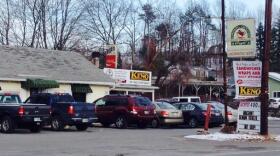Earlier this week a majority of cities in New Hampshire voted to allow the electronic gambling game Keno. But three communities rejected it.
And regardless of where in the state Keno is approved, under the new law now legalizing it, every school district will get the same share from Keno revenues to help pay for full-day kindergarten.
That’s left some people wondering how fair the new law really is.
Vaughn Roy is 75 and has lived in Berlin his whole life. He raised his kids here and now has grandchildren of his own. While Berlin voters approved Keno by a wide margin on Tuesday, Roy said he doesn’t plan to play. But said the city’s schools could use some additional money.
“I think the people here are looking for help wherever they can get it and hoping that Keno helps the economic situation at least partially up here," Roy said.

Berlin has the highest poverty rate of any New Hampshire city.
That economic situation may explain how Keno has been greeted across the state. The game has seen its biggest support so far in more financially stressed cities, including Laconia, Franklin and Claremont. That’s despite communities not having to approve Keno in order to share in the revenue it generates.
Claremont Mayor Charlene Lovett said because lower income areas tend to have smaller local tax bases, they’re more open to programs that promise increased state funding.
“When you have communities that are struggling to fund education at a time when we’ve seen a reduction in education grants from the state – those communities who have not as board of a tax base will be more creative in their approach of how to fund kindergarten,” Lovett said.
Keno also passed this week in Somersworth, Nashua and Manchester.
But it was rejected by voters in Concord and Dover. It didn’t even make it on the ballot in Portsmouth.
And in Keene, Keno failed by a nearly two-thirds margin.
"This Keno arrangement puts the poorest people in the poorest places in the state of New Hampshire paying for kindergarten in communities that are more affluent," Sen. Woodburn said.
Keene City Councilor Mitch Greenwald said it’s clear his community didn’t want the game. But said he has no problem using the additional money Keno will generate.
“The state has a responsibility to fund education and if this some little backwards way that they are throwing some pennies into our educational budget – I’ll take the money,” Greenwald said.
State Senator Jeff Woodburn of Whitefield says he wasn’t surprised by Tuesday’s results. Woodburn supports funding full-day kindergarten but voted against this new law when it was in the legislature – due to its tie to Keno. He said the policy is inherently unfair.
“This Keno arrangement puts the poorest people in the poorest places in the state of New Hampshire paying for kindergarten in communities that are more affluent and have schools that are actually attracting students and are growing and succeeding," he said. "So, it further divides the haves and the have-nots.”
Map: What NH Towns Will Have KENO?
Regardless of the debate over education funding, several restaurant and bar owners are eager to bring the games to their establishments. The state Lottery Commission says it’s heard from about 90 interested businesses.
One is Murphy’s Taproom in Manchester. Owner and State Rep. Keith Murphy said deciding on whether to have Keno in his restaurant was a “no brainer.”
“There’s studies out there that indicate that people that are playing Keno stay longer and they eat more and they drink more so that drives revenues for us and it drives revenues for employees and incidentally it drives revenue for the state," Murphy said.
Lottery Commissioner Charlie McIntyre estimates Keno will bring in about $9 million in the first year.






